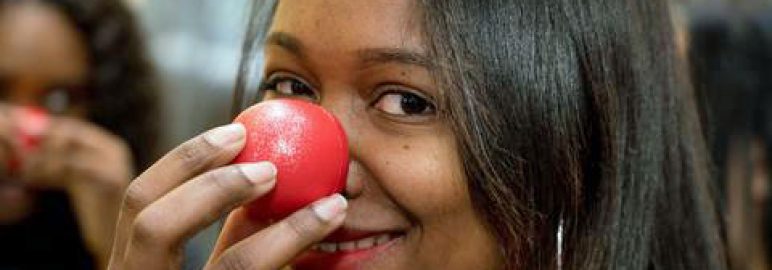 On May 24 this year, many Americans will don a red nose for charity. While Red Nose Day is focused on raising “money and awareness for children who most need our help” around the world, the goal is to have fun in the process.
On May 24 this year, many Americans will don a red nose for charity. While Red Nose Day is focused on raising “money and awareness for children who most need our help” around the world, the goal is to have fun in the process.
Comic Relief, a nonprofit organization, uses the power of entertainment to “drive positive change” through Red Nose Day. In this case, humor. The formula has been a success, and is a win for everyone, not just the children.
Research has shown that laughter has many benefits. It lowers blood pressure, induces calmness, increases pain tolerance and can even boost our immunity. Laughter also provides many social benefits by enhancing a sense of connectedness among those who laugh together. Laughter also allows us to express our true feelings.
According to Psychology Today, Martin Seligman, the father of the positive psychology movement, deemed “a good sense of humor one of 24 characteristics associated with well-being.”
Even dark humor has its benefits. “Dark humor may be a type of cognitive behavioral strategy that serves a dual purpose of exposing individuals to the topics they fear the most along with those super awesome bodily calming effects,” clinical therapist Meghan O’Flynn said.
Gelotology, the term coined in 1964 by Dr. Edith Trager and Dr. W.F. Fry to describe the scientific study of laughter, is by itself funny. The term comes from the Greek root gelos, “to laugh.”
Whether you smirk, smile, grin, snicker, giggle, chuckle, chortle, laugh, cackle, guffaw, howl, shriek, roar, convulse, or die laughing—with a red nose or not—laughter really is good medicine.
References
- http://www.dailymail.co.uk/tvshowbiz/article-171775/Everything-need-know-Red-Nose-Day.html
https://www.walgreens.com/topic/promotion/rednoseday.jsp - https://www.mayoclinic.org/healthy-lifestyle/stress-management/in-depth/stress-relief/art-20044456/2009/04/090417084115.htm
- http://dr-lee-berk.com/research3.html
- https://socialanxietyinstitute.org/he-who-laughs-most
- The active ingredients in humor: psycho physiological benefits and risks for older adults. Educational Gerontology, 27, 323-339. Fry, W. (1977).
- Fry, W. Respiratory components of mirthful laughter. Biological Psychology, 19, 39-50.
- Kuhn, C. The biology of humor. International Journal of Humor Rescearch, 7, 111-126. 1994.
- Martin, R. Stages of Laughter. Journal of Nursing Jocularity, 4, 34-35. 2002.
- Martin, R. Is laughter the best medicine? Humor, laughter, and physical health. Current Directions in Psychological Science, 11, 217-219. 2004.
- Sense of humor and physical health: Theoretical issues, recent findings and future directions. International Journal of Humor Research, 17, 1-19.
- https://www.psychologytoday.com/us/blog/the-humor-code/201109/the-importance-humor-research
- https://scholarsbank.uoregon.edu/xmlui/bitstream/handle/1794/7422/laughter.pdf
- American Physiological Society. (2009, April 17). Laughter Remains Good Medicine. ScienceDaily. Retrieved May 8, 2018 from www.sciencedaily.com/releases
- Adams, E., & McGuire, F. (1986). Is laughter the best medicine?
- Berk, R. A study of the effects of humor on perceived pain and affect. Activities, Adaptation and Aging, 8, 157-175. 2001.
- http://www.foxywinepocket.com/2014/07/10/darkhumor/

Sorry, comments are closed for this post.